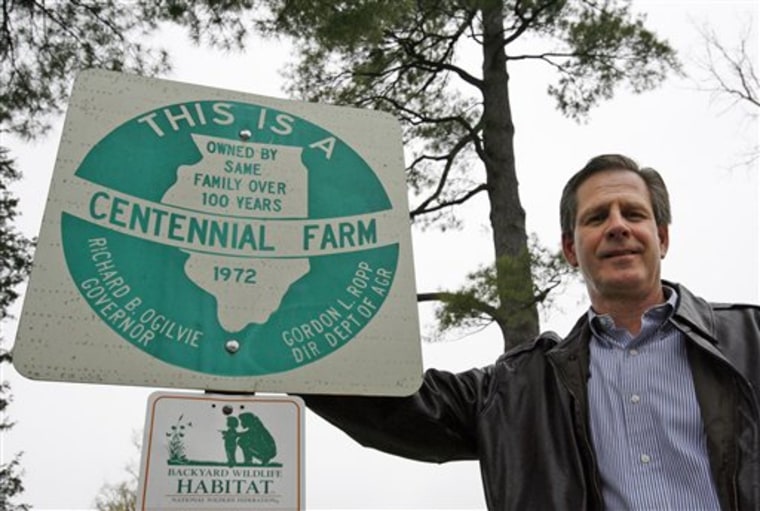They're furloughing many city workers for eight days this summer. They've cut staffing by about 5 percent. Now officials in Tracy, Calif., are trying another way to help make ends meet in these tough economic times: They've hired a Washington lobbyist.
It's an idea that seems to be spreading. Senate lobbying records show that dozens of cities and counties signed up with lobbying firms in the three months of this year. Their goal is to get a greater share of the money flowing out of Washington, from a record federal budget to the $787 billion economic stimulus package.
Some of the communities hiring lobbyists have done so before and are simply shuffling their lineup or adding to it. But others are getting into the lobbying game for the first time.
"This is a new venture for the city. This is a relatively conservative community and has a high degree of self-reliance, but we also understand there's also a great opportunity for all communities, Tracy included" said Leon Churchill, city manager for the suburban community about 60 miles east of San Francisco. "The opportunity was too immense to bypass."
Expectations are high
The city paid $10,000 to Patricia Jordan and Associates in the first quarter. Disclosure reports filed with the Senate show the firm lobbied lawmakers and the Federal Highway Administration on a highway spending bill. It also lobbied the Federal Emergency Management Agency for "emergency management" money. The stimulus bill provided the agency with hundreds of millions of dollars for grants to firefighters and improved transit and rail security.
The city of Baytown, Texas, also hired a lobbying firm. While there was some concern from city council members that such action encouraged more federal spending, City Manager Garry Brumback argued that the money was going to get spent regardless and that Baytown should get its share.
"The idea that they're going to lower your taxes if we don't accept any money is a little bit ridiculous," Brumback said.
The city will spend $40,000 for federal lobbying and $25,000 for lobbying at the state level. Expectations for the return on that investment are high.
"If you're not getting at least 10-to-1, you've hired a bad lobbyist," he said.
Lobbyist filed new registrations this quarter on behalf of major metropolitan areas such as Cook County, Ill., St. Louis and Seattle. But they also went to bat for scores of small towns as well. For instance, the village of Deer Park, Ill., with a population of 3,200 and a budget of about $3.5 million, hired a lobbying firm to help it get money for road and drainage projects.
"We were looking for a way to make up some of the shortfalls we see for the next couple of years until we get out of this recession," said Scott Gifford, president of the village's board of trustees.
In all, the community will spend about $60,000 this year on lobbying.
"The vote was 4-2 but the majority of the board felt it was worth the risk of spending $60,000 to potentially bring in $1.3, $1.5 million," Gifford said.
'We need to get our piece of the pie'
The city of Hartford, Conn., has used Washington-based lobbyists before, but decided to spend its money elsewhere in 2008. This year, it's back in the game.
"That's where the money's coming from right now and we need to get our piece of the pie," said Sarah Barr, director of communications for the city.
Cities and counties hiring lobbyists tend to spend in the tens of thousands per year, about what they would spend for hiring one employee. For that money they get a team of lobbyists, each of whom serves multiple clients. The team can include lawyers, former congressional aides and even former lawmakers.
For example, former Rep. Nancy Johnson, R-Conn., is one of three lobbyists looking out for Hartford. Former Rep. Bill Brewster, D-Okla., is a lobbyist for the town of Glenpool, Okla. Former Rep. Bob Livingston, R-La., is one of the lobbyists working for the state's Morgan City Harbor and Terminal District.
The stimulus legislation called for an extra $787 billion in spending, but President Barack Obama also put strict rules on what lobbyists can do to steer money their clients' way. Lobbyists cannot converse with federal officials or meet with them about specific stimulus projects. They can submit written statements advocating specific proposals for stimulus spending, which federal agencies must post on the Internet within three days.
Still, with Obama proposing spending $3.7 trillion for the budget fiscal year, local governments sense plenty of opportunity to secure federal money for their clients.
More interest from local governments
H. Stewart Van Scoyoc, president and chief executive of Van Scoyoc Associates, said he's definitely noticing more interest from local governments in hiring lobbyists.
"They're actively, aggressively looking for outside funding sources to help relieve the pain a little bit," Van Scoyoc said.
The change in administrations has spurred interest, too. The Bush administration was viewed as less supportive of aiming federal tax dollars at local initiatives. Cities and counties now believe they have a better shot at securing federal money.
"It's pretty much an unprecedented level of spending, a lot of it targeted toward state and local governments," Van Scoyoc said. "I think everybody is struggling to understand exactly how to react to it, how to access it and how to then effectively implement spending and go through all the auditing the feds are putting in place."
